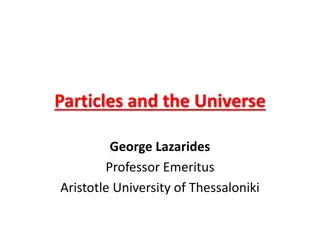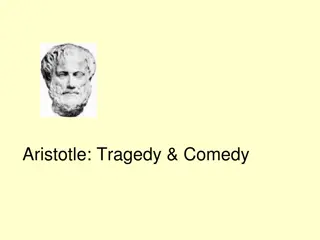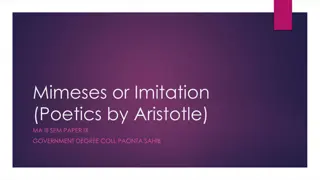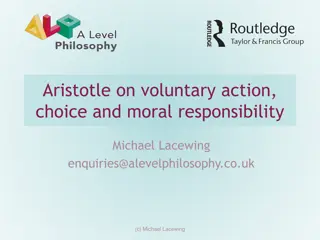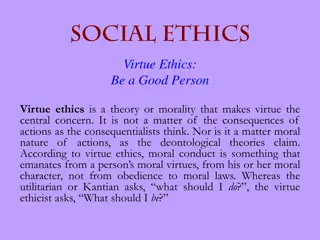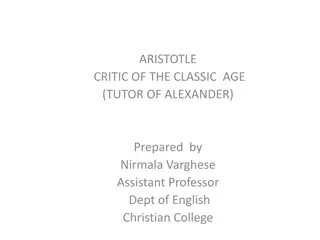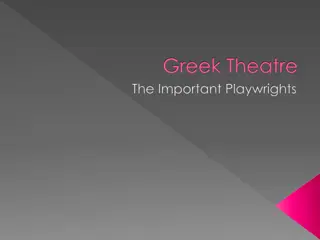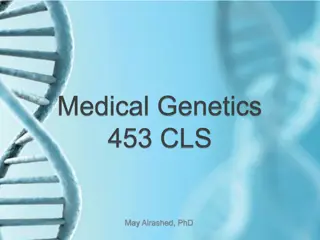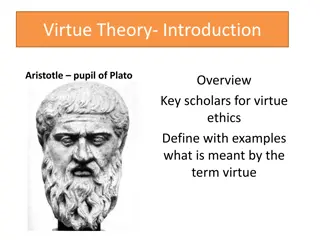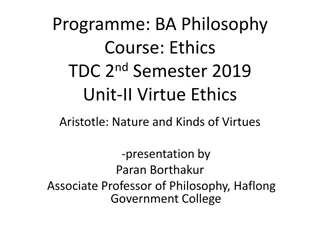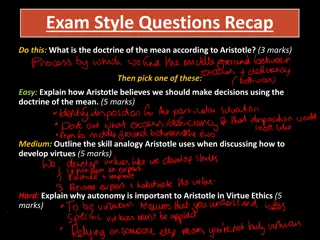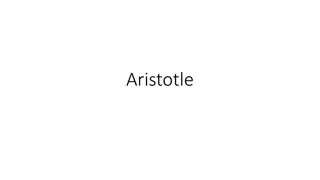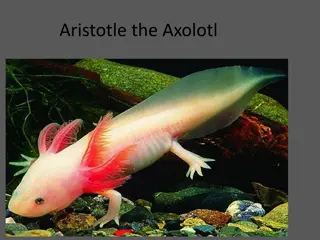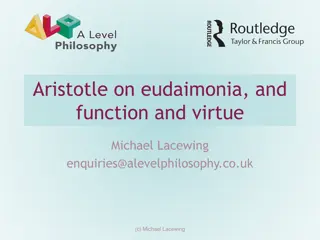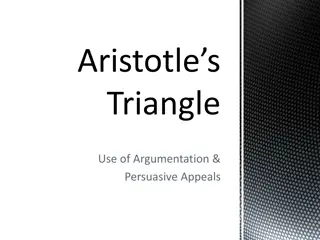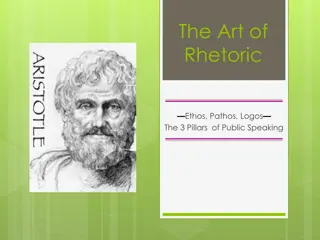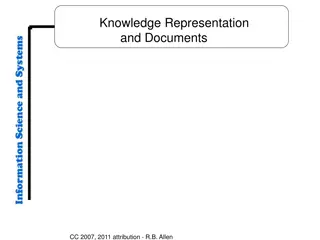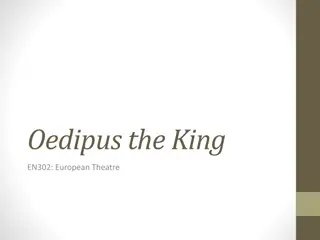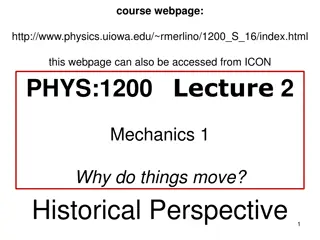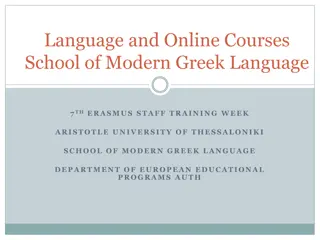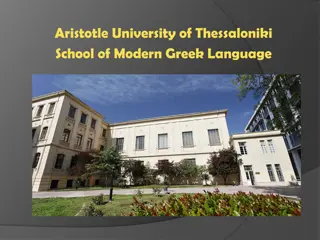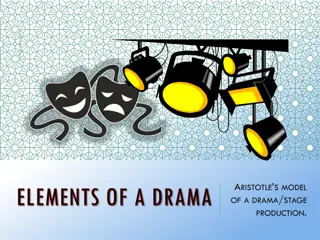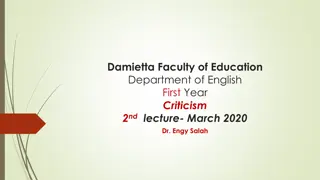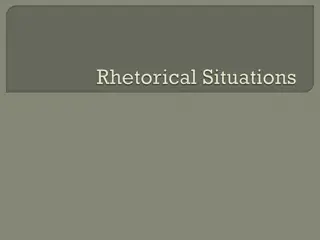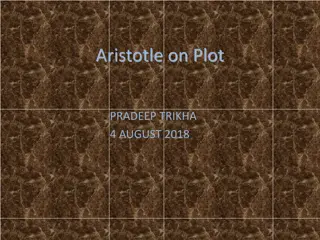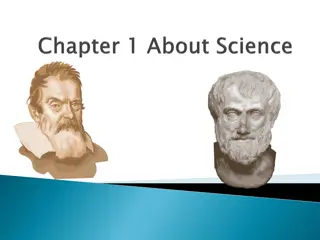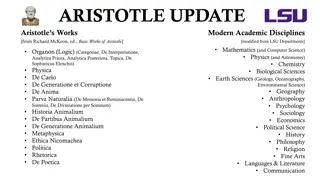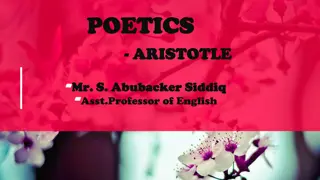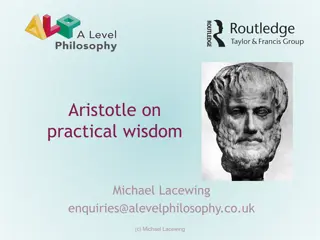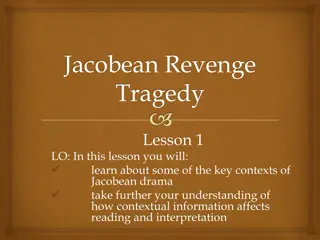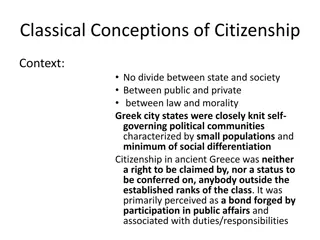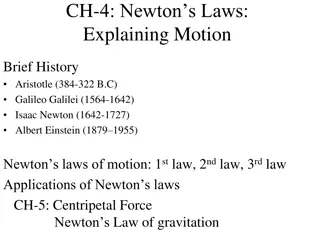Exploring Particles and Fundamental Interactions in the Universe
Delve into the intricate world of particles and fundamental interactions in the Universe as explained by Professor Emeritus George Lazarides from Aristotle University of Thessaloniki. Discover the structure of matter, classification of particles based on interactions, constituents of hadrons, conser
1 views • 36 slides
Aristotle's The Poetics: Tragedy and Comedy Analysis
Aristotle, the Greek philosopher, introduced key concepts in his work The Poetics, focusing on tragedy and comedy. He countered Plato's views on literature and emphasized the importance of imitation, catharsis, and the unity of time, place, and action in dramatic composition.
0 views • 32 slides
Analyzing Macbeth: Tragic Hero According to Aristotle
Delve into the complexities of Macbeth's character as a tragic hero through Aristotle's definition of tragedy. Explore the significance of unified action, character traits, and the concept of catharsis in understanding Macbeth's journey from good fortune to tragic downfall.
0 views • 16 slides
Ancient Greek Conceptions of Citizenship by Aristotle
Ancient Greek conceptions of citizenship, as discussed by Aristotle, emphasized the close-knit nature of city-states, where citizenship was a bond forged by active participation in public affairs. Citizenship was viewed as a privilege, exclusive in nature, with a strong emphasis on civic virtue, tru
0 views • 9 slides
Aristotle's Justification of Hierarchy and Republican Aspects of Citizenship
Aristotle's concept of citizenship involves a hierarchical structure where ruling and being ruled in turn is essential. He justifies this hierarchy by emphasizing the advantageous nature of ruling and being ruled. However, his views on citizenship in Greek city-states were limited to adult males, hi
4 views • 6 slides
The Theory of Mimesis in Aristotle's Poetics
Aristotle's theory of mimesis, outlined in his work "Poetics," contrasts with Plato's view by emphasizing that art imitates nature. He believes that poetry expresses the universal while history narrates the particular, highlighting the poet's freedom from factual constraints to explore larger truths
0 views • 12 slides
The Art of Rhetoric and Persuasion: A Journey from Greece
The history of rhetoric and the concepts of persuasion trace back to ancient Greece with prominent figures like Aristotle and Plato. Aristotle's book, "The Art of Rhetoric," introduced the three methods of persuasion - Pathos, Logos, and Ethos. Pathos appeals to emotions, Logos involves logic and re
0 views • 25 slides
Understanding Aristotle's Views on Voluntary Action and Moral Responsibility
Aristotle's perspective on voluntary actions emphasizes the distinction between voluntary and involuntary actions, exploring the role of force, ignorance, and choice in moral responsibility. He discusses how actions stemming from desire or emotion are still considered voluntary, while highlighting t
0 views • 12 slides
Understanding Virtue Ethics in Aristotle's Philosophy
Virtue ethics places virtue at the center of morality, emphasizing moral character over obeying laws or focusing on consequences. Aristotle's influence on virtue ethics is significant, highlighting the importance of striving to be a virtuous person whose actions stem from a virtuous character. Accor
6 views • 24 slides
Understanding Aristotle's Poetics: A Critique of the Classic Age
Aristotle, a tutor to Alexander the Great, delves into fundamental concepts in his work "Poetics." He challenges Plato's view of imitation, emphasizing creativity. Focusing on Mimesis, Katharsis, Hamartia, and Spoudaios, he explores the essence of art and tragedy, highlighting noble character and tr
0 views • 7 slides
Insights into Greek Theatre's Renowned Playwrights and Dramatic Elements
Greek theatre history and key figures, including important playwrights like Aeschylus, Sophocles, and Euripides. Aristotle's theories on drama elements, Thespis' innovations, and Aristotle's Unities of Drama are explored. The impact of these elements and playwrights on ancient Greek theatre is highl
7 views • 9 slides
Evolutionary Contributions of Prominent Scientists in the 19th Century
Charles Darwin, Gregor Mendel, Friedrich Miescher, Aristotle, and Carl Linnaeus were key figures in the 19th century who made significant contributions to the fields of evolution, genetics, DNA discovery, and taxonomy. Darwin proposed the theory of evolution and natural selection, Mendel established
0 views • 20 slides
Understanding Citizenship Through Aristotle's Four Aspects
Aristotle's concept of citizenship involves balancing individual autonomy, participation in public affairs, state authority, and social relations. A 2004 survey explored different dimensions of citizenship like participation, autonomy, adherence to social order, and solidarity. The data from the sur
0 views • 15 slides
Understanding Virtue Ethics and Aristotle's Virtue Theory
Delve into the world of Virtue Ethics with a focus on Aristotle's Virtue Theory, exploring the concept of virtue, key scholars in virtue ethics, and the development of virtues. Discover the Golden Mean, Eudaimonia, and the Beatitudes in relation to virtue theory, alongside discussions on moral decis
0 views • 21 slides
Aristotle's Virtue Ethics: The Nature and Kinds of Virtues
Aristotle's virtue ethics discusses the nature of virtues as a disposition unique to humans that enables them to function well according to reason. Virtue involves finding the mean between excess and deficiency, not endorsing mediocrity. It emphasizes that virtues are acquired through habitual pract
1 views • 18 slides
Al-Farabi: Influential Medieval Philosopher and His Ideal City Concept
Al-Farabi, influenced by Plato and Aristotle, was known as the Second Aristotle. His works spanned various fields like logic, math, medicine, music, politics, and ethics. He proposed a philosophy involving God as a beginning, being in the middle, and happiness as the end. Al-Farabi delved into the c
0 views • 5 slides
Understanding Aristotle's Doctrine of the Mean and Voluntary Actions
Explore Aristotle's doctrine of the mean, the skill analogy used in developing virtues, the importance of autonomy in virtue ethics, and the distinction between voluntary and involuntary actions in moral responsibility as discussed in his Nicomachean Ethics.
0 views • 22 slides
Understanding Aristotle's Theory of the 4 Causes in Physics
Dig into Aristotle's theory of the 4 causes applied to inanimate objects, exploring the nature of something, the intellectual context regarding change, and the significance of causes in philosophical inquiry.
0 views • 18 slides
Aristotle's Ethical Philosophy and the Concept of Eudaimonia
Aristotle, a renowned ancient philosopher, introduced the concept of eudaimonia in his Nicomachean Ethics. Eudaimonia, often translated as flourishing, signifies the ultimate human good achieved through fulfilling one's unique function well. Aristotle's ethical framework emphasizes the pursuit of vi
0 views • 22 slides
Exciting Class Pet Project: Welcoming Aristotle the Axolotl!
Father Christmas sent a special letter to Year 4, announcing the arrival of a class pet named Aristotle the Axolotl. The students are tasked with researching axolotls to prepare for caring for their new friend in January. They are encouraged to create a care leaflet and a map poster, with the best w
0 views • 4 slides
Understanding Aristotle's Concept of Eudaimonia and Virtue
Aristotle's philosophy delves into the concept of eudaimonia, which is not mere pleasure or wealth but the state of living well and flourishing. Eudaimonia is achieved through the exercise of virtues, qualities that aid in fulfilling one's function or characteristic activity. This pursuit of eudaimo
0 views • 10 slides
Understanding Aristotle's Communication Triangle: Logos, Pathos, Ethos
Explore Aristotle's Triangle of Argumentation and Persuasive Appeals, analyzing the role of logos, pathos, and ethos in effective communication. Discover how each element influences communication strategies, from rational reasoning and emotional appeals to ethical credibility.
0 views • 10 slides
Unveiling the Art of Rhetoric: Ethos, Pathos, Logos - Aristotle's Three Pillars of Persuasion
Aristotle's timeless principles of Ethos, Pathos, and Logos serve as the foundation for effective public speaking. Ethos focuses on credibility and character, Pathos on emotional appeal, and Logos on logical reasoning. Mastering these pillars can enhance a speaker's persuasiveness and connection wit
0 views • 49 slides
Understanding Knowledge Representation and Categories in Information Systems
Exploring various types of representations and categories, this content delves into Aristotle's classical view of categories, the contrast between Aristotle's empirical approach and Plato's Ideals, the concept of prototypes, and different models for categorization. It highlights how entities are cla
0 views • 21 slides
Analysis of Blame and Tragedy in Oedipus the King and Aristotle's Poetics
The question of blame is central in "Oedipus the King," where the city faces a plague and seeks accountability. Aristotelian concepts of tragedy, as outlined in "Poetics," delve into the structure and components of a tragic work, emphasizing plot development and cathartic emotions of pity and fear.
0 views • 28 slides
Understanding Language Anxiety in Foreign Language Learning and Teaching
Explore the impact of language anxiety on students and teachers in foreign language learning and teaching contexts through insights from Dr. Christina Gkonou's research. Delve into the theoretical background, implications for language education, and real-life experiences shared at the Essex Language
0 views • 25 slides
Evolution of Scientific Thought: From Aristotle to Newton
Explore the historical perspectives of scientific giants like Aristotle, Galileo, Tycho Brahe, Kepler, and Isaac Newton, as they revolutionized our understanding of motion and the universe. Witness the shift from ancient beliefs to modern scientific principles, culminating in Newton's groundbreaking
0 views • 23 slides
School of Modern Greek Language: Courses, Seminars, and Assessment Overview
Explore the School of Modern Greek Language at Aristotle University of Thessaloniki offering language courses, seminars for teachers, and assessment exams. Founded in 1970, the school provides a multicultural environment for students worldwide, emphasizing Greek culture and offering a variety of lan
0 views • 17 slides
Summer Programs at Aristotle University of Thessaloniki
Explore a variety of enriching summer programs at Aristotle University of Thessaloniki, including the School of Modern Greek Language and the International Summer School in Archaeology and Greek Language. From language courses to archaeological fieldwork, immerse yourself in Greek culture, history,
0 views • 16 slides
Understanding Aristotle's Model of Drama & Core Elements
Explore Aristotle's model of drama and the core elements of stage production. Learn how dramas differ from traditional stories, analyze scripts like "The Monsters Are Due on Maple Street," and delve into the 6 key elements of drama as outlined by Aristotle. Get ready to uncover the nuances of settin
0 views • 16 slides
Aristotle's Tragic Theory: Elements and Concepts Explained
Explore Aristotle's analysis of tragedy, including the six parts of tragedy, the definition of catharsis, the characteristics of a tragic hero, the concept of hamartia, and the comparison between epic and tragedy. Delve into the essence of tragedy as a medium for purging emotions and moral enlighten
0 views • 10 slides
Understanding Rhetoric: Aristotle's Three Means of Persuasion
Rhetoric, as Aristotle defined it, is the art of persuasion through available means. This involves utilizing logos (logic), pathos (emotions), and ethos (trustworthiness) to influence an audience. Writing serves various purposes like self-exploration, communication, entertainment, record-keeping, or
0 views • 16 slides
Aristotle on Plot and Tragedy: Understanding the Components and Structure
Aristotle's timeless insights on plot and tragedy delve into the constituent parts of tragedy, the structure of plot, types of plot, and the characteristics that make a plot effective. His definition emphasizes the importance of character flaws leading to the reversal of fortune in a well-crafted na
0 views • 7 slides
Evolution of Scientific Thought and the Scientific Method
Explore the evolution of scientific theories and methodologies through the works of influential figures like Aristotle, Copernicus, Galileo Galilei, and Francis Bacon. From the geocentric beliefs of Aristotle to the heliocentric model proposed by Copernicus, witness the shift in paradigms and the em
0 views • 14 slides
Aristotle's Works in Modern Academic Disciplines and Political Science
Explore Aristotle's works in disciplines such as Mathematics, Physics, Logic, Chemistry, Political Science, and more. Delve into his insights on political theory, regimes, and governance for the common good and ruler's advantage.
0 views • 6 slides
Aristotle's Poetics: An Overview of the Masterpiece
Aristotle's "Poetics" is a seminal work that delves into the essence of poetry, particularly tragedy and comedy. Written around 335 B.C., this treatise challenges Plato's ideas on mimesis and offers insights into poetry's societal significance. Divided into six parts, it explores various elements of
0 views • 15 slides
Understanding Practical Wisdom in Aristotle's Philosophy
Aristotle's concept of practical wisdom (phronesis) is essential for living a successful and fulfilling life. It involves having the right desires and making good choices based on a general conception of what is good for human flourishing. Practical wisdom enables us to deliberate well and act in ac
0 views • 9 slides
Key Contexts of Jacobean Drama
Explore the key contexts of Jacobean drama, including themes of revenge, ethical arguments, and the influence of ancient philosophers like Aristotle. Understand the origins of tragedy and delve into the elements that define Jacobean Tragedy. Discover the relevance of Plautus and Seneca, and examine
0 views • 11 slides
Ancient Greek Citizenship and Aristotle's Views
In ancient Greece, citizenship was a bond forged through participation in public affairs, with emphasis on duties and responsibilities rather than rights. Aristotle's views on citizenship emphasized active political participation, civic virtue, and exclusivity. Citizens were those involved in the ci
0 views • 7 slides
Evolution of Motion Theories: Aristotle to Einstein
Explore the progression of motion theories from Aristotle's belief in a force for motion to Galileo's discoveries on gravity, Newton's laws of motion, and Einstein's theories of relativity and quantum mechanics. Discover how our understanding of motion has evolved over the centuries, shaping the way
0 views • 20 slides
